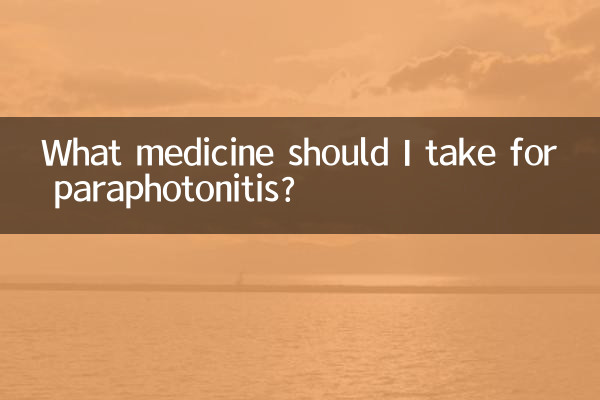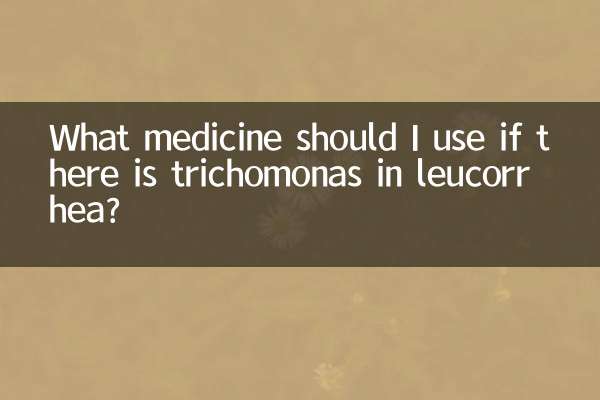What medicine should I take for paraphotonitis?
Medications for treating paraphotonitis (cystitis) have become a hot topic recently, with many patients and family members discussing related treatment options on social media and health forums. This article will combine the hot content on the Internet in the past 10 days to sort out the commonly used drugs and precautions for paraphotoitis.
1. Overview of paraphototitis

Paraphotonitis is an inflammation of the bladder mucosa. Common symptoms include frequent urination, urgency, and painful urination. According to the cause, it can be divided into two categories: bacterial and non-bacterial, among which bacterial cystitis is the more common.
2. Commonly used drugs for paraphotoitis
| drug type | Representative medicine | Mechanism of action | Things to note |
|---|---|---|---|
| antibiotics | Levofloxacin, cefixime | Kill disease-causing bacteria | It needs to be taken according to the course of treatment to avoid drug resistance. |
| Chinese medicine preparations | Sanjin tablets, Relinqing granules | Clear away heat, detoxify, diuretic and relieve stranguria | Suitable for mild disease or adjuvant treatment |
| Antispasmodics | Anisodamine | Relieve bladder spasms | May cause side effects such as dry mouth |
| painkillers | Ibuprofen | Relieve pain and discomfort | Not suitable for long-term use |
3. The treatment plan that is hotly discussed on the Internet
According to the recent popularity of online discussions, the following treatment options have received widespread attention:
| treatment plan | Support ratio | Main advantages | Things to note |
|---|---|---|---|
| Integrated Traditional Chinese and Western Medicine | 68% | Treats both symptoms and root causes with minimal side effects | Requires professional physician guidance |
| Simple western medicine treatment | 25% | Quick effect | possible drug resistance |
| naturopathy | 7% | No drug side effects | Only suitable for very mild symptoms |
4. Dietary conditioning suggestions
In addition to drug treatment, dietary conditioning is also important:
| Recommended food | avoid food | Drinking water recommendations |
|---|---|---|
| Watermelon, cucumber and other diuretic foods | spicy food | 2000-2500ml daily |
| Fruits rich in vitamin C | alcoholic beverages | Drink small amounts frequently |
| Light and easy to digest food | High sugar foods | Drinkable light bamboo leaf water |
5. Preventive measures
To prevent the recurrence of paraphotoitis, you need to pay attention to the following points:
1. Pay attention to personal hygiene, especially women’s menstrual hygiene
2. Avoid holding urine for a long time
3. Proper exercise to enhance immunity
4. Avoid overwork and mental stress
5. Pay attention to cleanliness before and after sex
6. Medical advice
You should seek medical treatment promptly if the following situations occur:
1. Symptoms persist for more than 3 days without relief
2. Symptoms such as fever and low back pain occur
3. Blood in urine
4. Pregnant or pediatric patients
5. Recurrent attacks more than 3 times/year
7. Popular questions and answers on the Internet
| FAQ | Professional answers |
|---|---|
| Can paraphotoitis heal on its own? | Mild symptoms may heal on their own, but timely treatment is recommended to avoid worsening. |
| How long do I need to take antibiotics? | Usually 3-7 days, you need to follow the doctor’s advice to complete the course of treatment |
| What should I do if Chinese medicine is slow to take effect? | Chinese and Western medicine can be combined, and Chinese medicine needs to be taken continuously for 1-2 weeks. |
| How to prevent recurrence? | Enhance immunity, drink more water, and avoid triggers |
The above content summarizes the information related to the treatment of paraphotonitis that has been hotly discussed on the Internet recently. I hope it can provide you with a reference. However, please note that you need to consult a professional physician for specific medication plans and do not self-medicate.

check the details

check the details